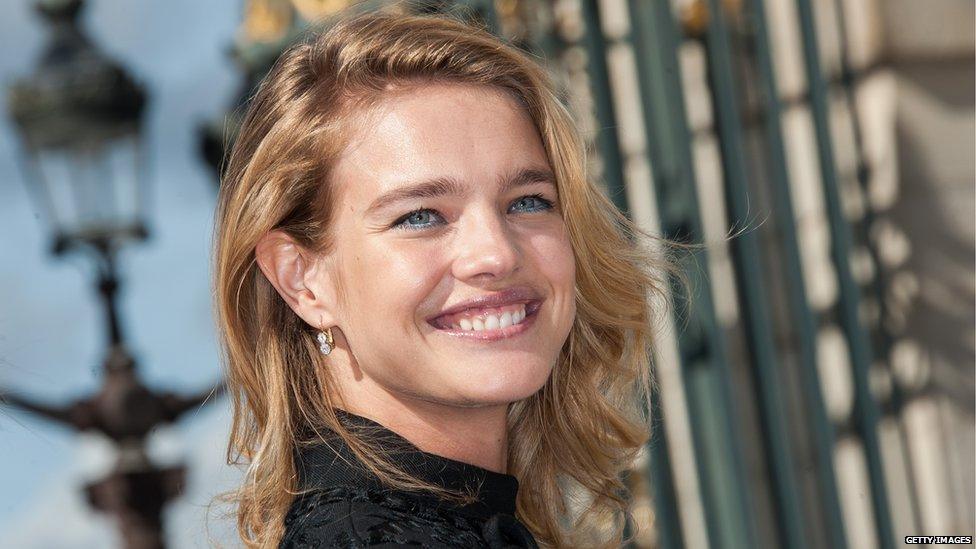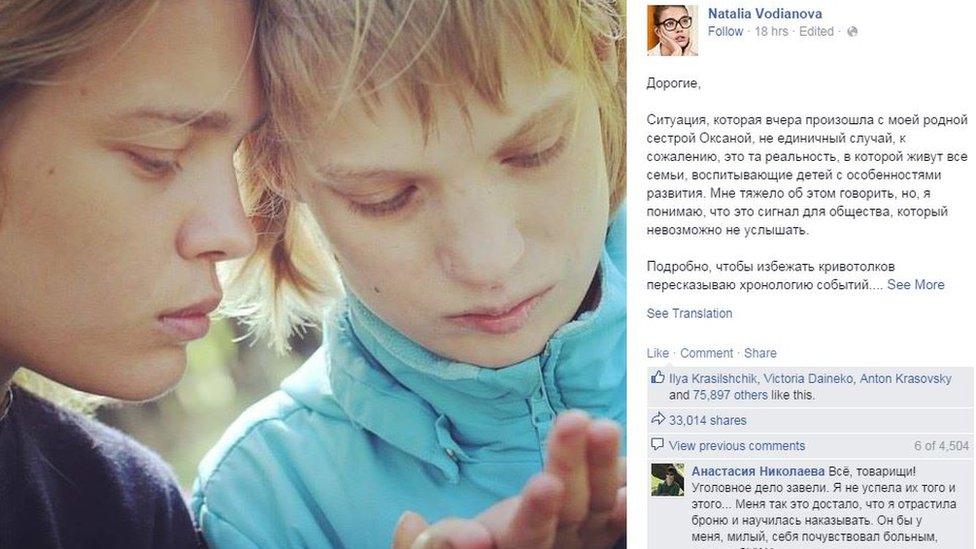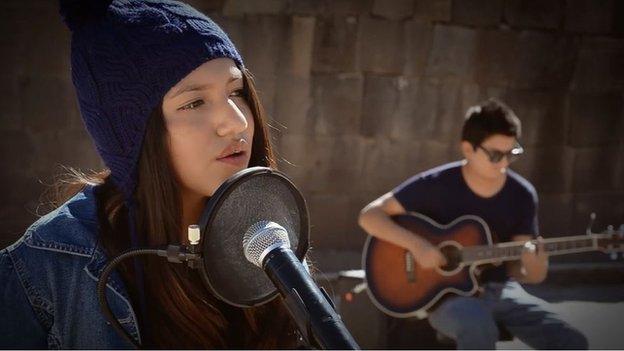The Russian supermodel who defended her autistic sister
- Published

A supermodel has started a debate about rights for disabled people in Russia.
It all started on 11 August, when 27-year-old Oksana, who has autism and cerebral palsy, went to a cafe with her carer. It was a hot day in the Russian city of Nizhny Novgorod and the pair wanted to rest. But it appears the owner of the cafe didn't take kindly to Oksana, and she was soon shown the door for allegedly "scaring all the customers away".
The incident might usually have gone unnoticed.
But Oksana's sister happened to be a supermodel.
Natalia Vodianova, who has appeared on the cover of Vogue and fronted campaigns for Calvin Klein, took to Facebook, external to share her sister's story late on 12 August. According to Vodianova's post, the owner demanded that both women leave immediately. "Leave. You're scaring all our customers away. Go and get medical help for you and your child. And then go out in public," he apparently said.

After the carer tried to explain that Oksana has special needs, the owner apparently called security guards to force the two women out. "Leave, or we'll call a nuthouse, and an ambulance, and will lock you in a cellar," Vodianova quoted one of the guards as saying.
Natalia and Oksana's mother Larisa was called, and the women were all taken to the police on suspicion of "minor hooliganism".
Criminal inquiry
Within a day, the Facebook post had 80,000 likes and over 4,700 comments. The story made it onto major TV channels. No charges were brought against the women, and instead the attention prompted a criminal investigation into whether there had been "humiliation of human dignity" by the cafe owners.
The owners defended their actions, however. They said Oksana was behaving "strangely".
"She was sitting on the pavement for an hour. She hit her head against the wall," Anar Bayramov, the owner's son, told the state owned Rossiya 1 TV channel. Online, some agreed with the owners. "The look of a sick person does not improve your appetite," said a comment , externalon VKontakte, Russia's answer to Facebook.

Analysis: Lee Kumutat and Kathleen Hawkins, BBC Ouch blog
The effects of an encounter like this can be long-lasting and even indelible for disabled people.
In the UK certain places have acknowledged that autistic people and those with other disabilities, including cerebral palsy and Tourette's, may be unable to sit quietly for long durations of time.
In Russia, the 2012 Winter Paralympics in Sochi were considered a success in terms of accessibility for disabled people. There is also legislation relating solely to disabled people which was adopted in 1995, but Tanya Cooper from Human Rights Watch says this does not relate to discrimination, and only covers benefits, employment and subsidies.
At present the cafe owner is being investigated by Russia's Federal Investigative Committee. But Cooper says it would make more sense to use anti-discrimination law consistently, instead of applying an excessively harsh article of the criminal code which could result in five years in prison.
As a former resident of Moscow, she said that disability discrimination is "rampant and engrained" in Russia, and many Russians treat disabled people "as if they are diseased or ill and should be shut out of the public eye".

But many more Russians sided with Oksana online, and condemned the cafe owner's actions. "These people are sick, they are an embarrassment for humanity," wrote Sarmad Akram on Vodianova's Facebook page. Prominent Russians joined in the criticism. "I will never set foot in the Flamingo cafe and I hope you will support me," editor-in-chief of The New Times magazine Yevgeniya Albats tweeted, external.

"I will never set foot in the Flamingo cafe and I hope you will support me," says editor-in-chief of The New Times magazine Yevgeniya Albats.
Other Russians questioned Vodianova's motives, saying she was seeking media attention. "The disabled have nothing to do with it, Vodianova has inflated her PR Western-style," one person tweeted, external. "Ms Vodianova, since you have so much money, why haven't you provided your sister with a life in some proper health centre for sick people by the sea, for instance?" a VKontakte user asked, external.
According to disability experts, the situation with Vodianova's sister is "typical" for Russia, and "every family with such a child" faces similar situations. Irina Dolotova of Road to World - a Russian charity for children with special needs - tells BBC Trending that Russia is just "at the beginning of the path" in terms of disability rights protection. "This situation is new. Until the 1990s it wasn't considered acceptable to show such children, there are a lot of superstitious beliefs, and there's little awareness in society," she says.

Translation: "Vodyanova's sister who suffers from cerebral palsy has been kicked out of a café in Nizhnoy Novgorod. Humanity and kindness are not currently in fashion."
Blog by Olga Bugorkova
Next story: What Michael Jackson is doing for an ancient language

A 14-year-old girl's cover of a Michael Jackson song is changing the image of the Quechua language. WATCH
You can follow BBC Trending on Twitter @BBCtrending, external, and find us on Facebook, external. All our stories are at bbc.com/trending.